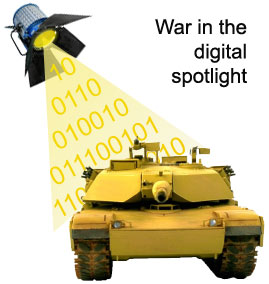A Cambridge perspective
on the digital world



March 2003
Digital prophets from the 1960s onward have predicted that technology would change the world. What happened?
Well, it happened: digital technology is all around us. No longer a 'Tomorrow's World' future, digital devices from computers to mobile phones to TVs are now routine, and we are living with the consequences.
In fact, the consequences have been as profound as the digital prophets said they would be - but they have not all been positive. Work, daily life, politics, and even war now work differently because of digital technology. But after the heady promises of the dot.com era, the economy now appears to be in worse shape than ever, apparently unable even to meet commitments on pension payments.
Meanwhile the 'global village' seems less like a friendly parish pump, and more like a breeding ground for terrorist threats. If these problems were not directly caused by technology, many of them can be put down to the fact that the world is a much smaller, more intimately connected and less predictable place - which technology has certainly brought about.
But if so, perhaps the real problem is that our ways of thinking have not caught up with current reality. By analogy, we are trying to deal with the problems of the motor car using thoughts, attitudes and institutions that were formed in the horse drawn era.
Digital technology has transformed industries across the board, and many are reeling from the shock - a key reason why stock market performance has been so dismal since the dot.com crash, and why pension payments are now at risk.
The telecommunications industry used to be a licence to print money, largely because the entry costs for any new company were so prohibitive that established players had the field to themselves. Digital technology reduced entry costs dramatically, and made it possible for many new players to compete with old established incumbents. Competition is generally a good thing; but the opportunity led both old and new players to over-invest in anticipation of demand, leading to the classical situation of a glut in capacity, followed by a crash. The situation will correct itself within two to three years, but for now balance sheets worldwide are full of red ink. But telecommunications is in the vanguard: companies in many other sectors have yet to feel the full force of 'digital shock'.
What happened in telecommunications also happened on a broader scale with dot.coms. The Internet suddenly made it ten times to start a business - any business. As a result thousands rushed in. To the problem of overcapacity was added the additional problem of inexperience. Many of those who joined in this millennial gold rush were inexperienced not just in technology, but in the fundamentals of business: customers, markets, income, costs, margins, cash flow, and day to day operational management. The result was rather like watching an express train headed over a cliff, and the outcome equally predictable.
Investors are now licking their wounds: sitting on the money they have, and extremely cautious about risking it on any venture, of whatever kind. Meanwhile managers in existing companies are hanging on to whatever business they already have, afraid of moving a millimetre outside established business territory. The caution is understandable; but until we can move beyond this the economy as whole is condemned to slow decline.
Without investment, the businesses that exist will become less and less suited to an environment that is changing around them, less able to generate profits for shareholders, less able to pay pensions, less able to afford the taxes that support government and public services, and less able to pay for the support industries that supply the services they need. Without investment, the economy is doomed to a slow death. With the decks cleared by business failures, many opportunities now exist; but they will not be exploited unless attitudes change.
 Politics
and war
Politics
and warWhat of war? The Gulf war was conducted in the digital spotlight of the media; in the case of Iraq, even the preparations for war are being carried out under the eyes of six billion people, many of whom want to have their say in the process. Decisions by political leaders were once carried out behind closed doors; now, every nuance of their words, actions and thoughts is analysed, almost before it happens.
Does it even make sense to speak of war - a means of resolving conflicts between nation states - when the entire world community is involved, and the conflict is as much within as between countries? Even the language we use seems outdated.
On a more mundane level, digital technology affects every aspect of our life and work. More and more people are finding it possible to work from home, for at least part of the time. But there is evidence that neither individuals nor companies have yet evolved appropriate ways to manage this, while maintaining a sensible work/life balance, and dealing with the new management issues raised by employees who are not physically present. A new report by the Social Market Foundation suggests that employees who telework actually use the time saved to work harder and longer - delivering up to 30% more productivity - while managers worry that the people they supervise may be shirking. The culture of 'presenteeism' encourages people who want to get on to be seen at their desks, whether what they are doing is actually productive - or even work-related - or not. On a small scale, this is symptomatic of the problems in all areas: reality has changed, but our thinking and attitudes have not.
Digital prophecy and digital gold rush led to digital shock, and digital collapse. What we need now is digital routine: a recognition that this technology is here to stay, and we have to deal with it on a sustainable basis. New thinking is needed - not 'blue sky', but connected to the observable and current reality that is now everyday. We are living with it; we now need to deal with the consequences.
©2003 Mediation Technology
